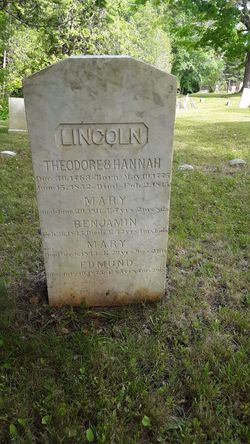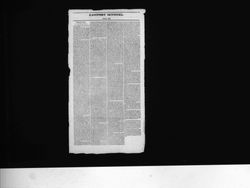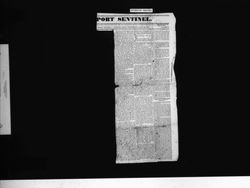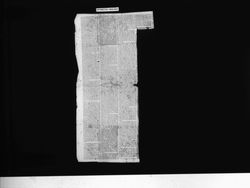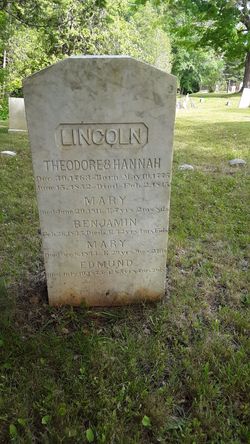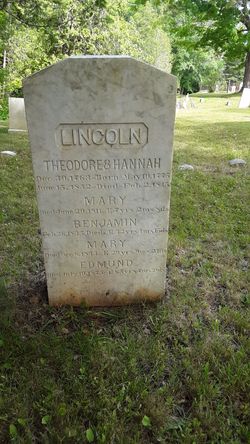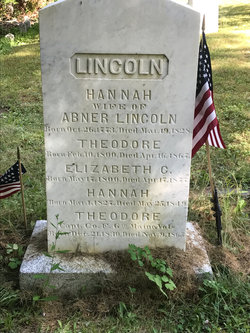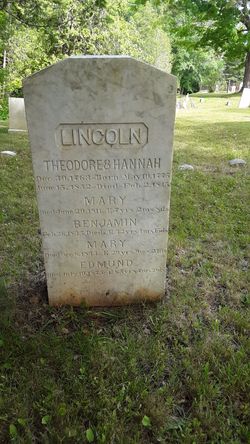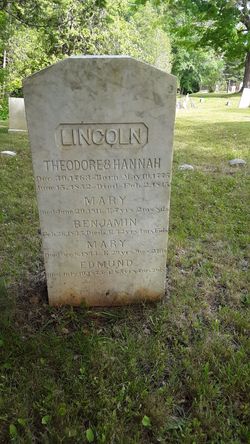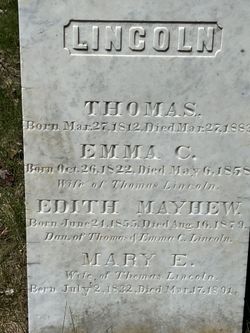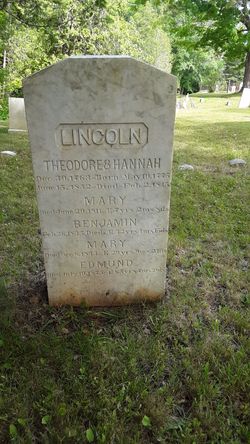| Description |
: |
DEATH INFORMATION:
Died unmarried. He was a doctor. He was a Professor at the University of Vermont, Burlington College.
Eastport Sentinel - August 1835
OBITUARY.
[From the New England Magazine.]
Died, at Dennysville (Me.) twenty-sixth of February, 1835, BENJAMIN LINCOLN, M. D., aged thirty-two years.
When a man dies, whose character was ennobled by great virtues, and whose attainments were all that industry and talents of a high order could accomplish, but whose career, though an honorable one, was too short to extend his fame beyond a comparative narrow circle, we feel...
Read More
|
DEATH INFORMATION:
Died unmarried. He was a doctor. He was a Professor at the University of Vermont, Burlington College.
Eastport Sentinel - August 1835
OBITUARY.
[From the New England Magazine.]
Died, at Dennysville (Me.) twenty-sixth of February, 1835, BENJAMIN LINCOLN, M. D., aged thirty-two years.
When a man dies, whose character was ennobled by great virtues, and whose attainments were all that industry and talents of a high order could accomplish, but whose career, though an honorable one, was too short to extend his fame beyond a comparative narrow circle, we feel an interest in his life very different, and in its moral effects far better, from that with which we regard those who have made a place for themselves in the pages of history; and the example comes home to us with peculiar force and efficacy. Need we offer any further reason for dwelling a few moments on the memory of one who presented a rare combination of moral and intellectual excellence, and created in the minds of his acquaintances some conceptions of the worth and dignity of our nature.
Dr. Lincoln was born at Dennysville (Me.) in October, 1802, and was the son of Hon. Theodore Lincoln of that place, and a grandson of Major-General Benjamin Lincoln of the Revolution. He was graduated respectably, at Bowdoin College in 1822, and soon afterwards commenced the study of medicine. Having studied the requisite time with Dr. Shattuck, and received his medical degree at Brunswick, he entered upon the practice of his profession in this city, in the autumn of 1827. During the summer of the ensuing year, he was invited to deliver the course on anatomy and physiology, in the College at Burlington, (Vt.). The manner in which he succeeded in this duty, - for which he had probably as little special preparation as any man who ever undertook it, - may be inferred from the fact, that the next year he was elected to the professorship - an office which he continued to hold, with increasing satisfaction, until the last year of his life. At Burlington, which he immediately made his place of residence, he again, about three years since, entered into practice, and was rapidly advancing in business and reputation. The failing health of the late Dr. Wells, in 1830, compelling him to abandon his duties as lecturer on anatomy at Bowdoin College, Dr. Lincoln consented to supply his place for the season, and also succeeded this gentleman the next year, in the same office in the University of Maryland, at Baltimore. Though strongly urged to stand as a candidate for the professorship, to which he would undoubtably have been elected, considerations, not necessary to mention here, led him to decline, and he returned to Burlington, to pursue his studies with renewed spirit, and to mature plans for future action. In the spring of last year, he took a violent cold, which rapidly reduced a constitution, already enfeebled by disease and over-exertion, to a state of debility, from which he never recovered, and it was soon followed by the too evident symptoms of pulmonary consumption. He succeeded, however, in reaching the residence of his family; and there, amid the attentions of his friends, with the cares and promises of life behind and the haven of eternal rest before him, he spent some of the happiest moments of his existence.
The events of his life were few indeed, and of no extraordinary kind; but what they especially impress upon our notice, is the ardor of disposition and severity of industry, seldom if ever equaled, that enabled him to triumph over every obstacle in his course, and carried him through, with credit to himself and satisfaction to all with whom he was connected. Until a few months before his first course of lectures, anatomy was far from being a prominent object of his attention, and he was by no means a skillful dissector; (chemistry and music were his favorite pursuits,) yet, within six years, he became second to few men in the country in the accuracy and extent of his anatomical attainments. He found the college destitute of preparations and other means of illustrating lectures; and with a little assistance from his pupils, he enriched it with an anatomical cabinet of more than one hundred pieces, - many of which, in the accuracy and minuteness of dissection, have not been often surpassed, - besides a great number of models and drawings, chiefly the work of his own hands. All this was done too, while much of his time was occupied in the business of private instruction, private practice, in lecturing at other institutions, and in visits to his friends at a distance. An idle moment was a thing unknown to the last eight years of his life; every minute had its duties, and he was never happier than while he was engaged in the severest labor of body and mind. Even while visiting his friends, which was ostensibly for the purpose of relaxation, his industry never ceased; and no sooner were the greetings of his acquaintances over, than his head and hands found something to do. During one of these visits, of a few weeks, he delivered two courses of lectures, on anatomy and physiology, to popular audiences - the preparation for each of which, in making drawings, models, etc. occupied one or more hours, besides engaging in some anatomical labors, and expending considerable time in reading and writing. If such industry constraints our admiration, what shall we think of it, when told that he, of whom we are speaking, was a martyr to rheumatism and neuralgia - that, from his twentieth year, he scarcely knew what it was to be an hour without pain and very often it was excruciating. From the time we mention, his back became so bent that he never afterwards was able to assume the erect position; and frequently, for weeks together, it was two or three minutes’ work for him to rise from his bed in the morning.
The distinguishing trait in Dr. Lincoln’s character - that which endeared him to as large a circle of warm, personal friends as a man of his age could leave behind him - was active benevolence. Its spirit was manifested in every thought and action; it pervaded and animated his whole being. It was witnessed in all of his opinions; for, whatever measures or principles were presented to his attention, they were viewed through the medium of an all-embracing philanthropy. In his relations with his friends, this disposition, of course, was particularly active. For them, it is incredible how much he was in the habit of doing. Their concerns were, to a certain extent, his concerns; their happiness was identical with his own; and no exertions, on his part, were too great to promote their interests. With a sacrifice of time and convenience, no one but himself could adequately appreciate, we once saw him quitting his studies, during the pupilage, to accompany a friend on a voyage to a distant part of the country, for the purpose of affording him counsel and aid, through a long and harassing sickness. He was no more attached to this person than to many others; but he saw him about to depart into a land of strangers, unable to help himself and poorly provided with the attendance his condition required, and it was enough for him to know, that his presence would be materially conductive to his comfort. Even in his last sickness, when, if at any time, a man will be engrossed with his own concerns, it was impossible to discover any diminution of his usual solicitude for the happiness of those around him.
But his philanthropy was by no means of that narrow kind, which finds its objects exclusively at home; it embraced the whole range of human affairs, and was the strong and abiding incentive to action. When satisfied that a measure was calculated to do good, his best efforts were always ready to further its success; for it was not a habit with him to wish well to a cause without giving it the benefit of his own assistance. No man ever lived more for others and less for himself; had it been otherwise, we should not now be mourning his loss. To this disposition, must be attributed the fatal error of overtasking his powers - the only error of any consequence, he ever committed, - selfishness, in the ordinary meaning of the word, was foreign to his nature; the sight of others’ happiness kindled a warmer glow of delight in his bosom than any mere personal considerations ever could. Like other men, he was sensible to the favor of the world; but his ambition was a lofty and honorable one, and completely subjected to the supremacy of the higher sentiments. The essential condition of every measure that engaged his service, was its tendency to do good, and just in proportion to this tendency did he estimate its importance, and the degree of consideration it deserved.
In the practice of his profession, his benevolent spirit found ample scope for its exercise; and here it was displayed in some of its noblest and most engaging forms. His time and counsel were at the service of whoever chose to ask for them; while the idea of renumeration was, of all others, the most remote from his thoughts. The poor and friendless found in him an unfailing friend, who not only applied his skill to the cure of their diseases, but relieved their wants to the utmost extent of his means, and cheered their spirits with words of consolation and encouragement. The more destitute and helpless they were, the more strongly did they seem entitled to his personal attentions and to all the resources of his art. Many a time, when he found such a one suffering from the want of suitable attendance, he has bid adieu to professional dignity for a while, and cheerfully employed himself in the humbler duties of nursing. On one occasion, after riding several miles to visit a patient of this description, and with whom he had passed the whole previous night, we saw him spend an hour in repairing the windows, putting fastenings on the doors, and performing other little services, in order to make him warm and comfortable. The relations between physician and patient, were always on his part of the highest and most interesting kind. His intercourse with those who came under his care, was characterized by the utmost urbanity and kindness of manner, which was prompted by no view to popularity, but because he really sympathized in their sufferings, and felt an interest in all that concerned their welfare. From that besetting disposition which long-continued practice engenders in the mind of almost every physician, to view his patients as furnishing cases of pathological investigation merely, he was remarkably free. In him, the philanthropist and physician were beautifully combined; he never forgot that his patient was also a member of the human family; and after he had prescribed for the former, he always found occasion for the exercise of the best feelings of his heart upon the later. Little as he had of that repulsive hauteur, which seems to grudge an extra word or look in the sick room, he has less, if possible, or that silly or swaggering affectation of good-humor assumed by vulgar minds; but ever preserved his native dignity of manner, gracefully tempered by an air of ease and mildness, which won the affections as well as the respect of his patients.
Though benevolence was a prominent, it was by no means the sole characteristic of a nature in which all the moral sentiments were manifested with extraordinary strength and activity. Everyone, much acquainted with Dr. Lincoln, must have been struck with a certain purity and elevation of character, and strict, unwavering conscientiousness displayed in all his dealings with mankind. Perfectly upright and honorable himself, he was little inclined to look with indulgence on the absence of these qualities in others. With him, right and wrong were positive terms, the force and signification of which never varied with changes in circumstances or persons. He was unable to gloss over the slightest deviation from the straightforward path of fair and honorable conduct, with any of those palliative excuses and forms of phraseology, that pass current with the possessors of an easier virtue. He called things by their right names, and was determined, wherever he was concerned, that they should go by no other. This integrity of principle and purpose was admirably supported by an unflinching, unaffected independence of character, that added tenfold to the force and prominence of his example. He made no compromise with vice, for, in whatever guise it appeared, it incurred his thorough reprobation, and no human power could deter him from the faithful expression of his opinions. There was a moral atmosphere around him, the salutary effect of which was clearly perceptible on those who came within its influence. Even in his younger days, he was never guilty of that confusion of moral distinctions which looks on the perpetration of mischief for the sake of amusement, as a species merely of innocent recreation. Yet no one was more beloved by his associates, and no one was freer from the suspicion of meanness and duplicity. With the indulgence of a warm-hearted philanthropist, toward the follies and weaknesses of his fellow-men, no scruple of delicacy ever induced him to spare the voice of censure and admonition, whenever it was likely to do good. True, his plainness of speech sometimes gave offence, and made him the only enemies he had; but, accompanied as it was by his peculiar ingenuousness of manner, and an irresistible air of sincerity, it generally left an impression, both salutary and durable. In the discharge of his public duties, he was guided by the same spirit of conscientiousness - ever acting with the utmost fidelity to his trust, and coming up to the very spirit and letter of his engagements. Whatever might be his duties, he devoted all the powers of his mind and body to their performance, till the superabundance of his zeal and exertion became a matter of astonishment and admiration. To spend and be spent, in the most literal signification of the terms, seemed to be the principle on which he always acted.
Another very important trait in his character, which, as we are writing for the living, it would be unpardonable not to notice here, was a fixedness of resolution and an indomitable perseverance under every form of difficulty and discouragement. Whatever he undertook, he accomplished; and obstacles which would have effectually deterred most other men, served only to increase his energies and strengthen his resolution. Animated by high hopes and noble purposes, with his object distinctly in view, and confident in his ample resources, he proceeded steadily and cheerfully on his course; and neither difficulty nor disaster could make him swerve from his path. - Charged with a trust of the highest responsibility, for which he had received the slightest possible preparation, and suffering constantly from a harassing disease, nothing, indeed, but the most remarkable firmness, could have carried him through to the successful and brilliant result of his exertions. No task seemed too great for his powers, no object too distant for his comprehension, when the voice of duty called, or the prospect of doing good was before him.
All who were intimately acquainted with Dr. Lincoln, must have observed the buoyancy of his spirits, the unclouded happiness he seemed to enjoy, and that contentment of disposition, which neither pain nor disappointment could disturb. The goods of life he enjoyed with a keen relish; its ills he considered as matter of course, and bore them without fretfulness or repining, as if, apparently, they were unworthy of a thought. Nothing, in short, seemed to render him conscious of their presence, but the check they sometimes imposed on their labors in the cause to which he was devoted. While suffering an attack of his disease, which affected his neck and back with unusual severity, though it appeared to be scarcely noticed by him, engrossed in comparative anatomy, he replied to the commiserations of friends, that, ‘so long as it left him hands to work and eyes to see, he should have no reason to complain.’ His mind was seldom clouded by disquietude and anxiety; and the numerous annoyances of life, which seriously affect the temper of most men, and for the time, incapacitate them from exertion, were never permitted by him to diminish, in the slightest degree, his accustomed activity and cheerfulness. Calumny even, while it excited a momentary indignation, could not plant a thorn in his bosom, or scarcely ruffle the ordinary tranquility of his character. How essential this equanimity was to his happiness, he was well aware; and, unless urged by a sense of duty, was careful to abstain from participating in party conflicts and other matters of temporary interest, in which it would be liable to be sacrificed. Peace and independence of mind he prized above all earthly treasures. The world had nothing of honor or profit, for which he would give up one particle of his natural portion. This disposition was particularly manifested during his last sickness; and dull must he have been to one of the noblest exhibitions of human fortitude, who could observe him then without being filled with emotions of pleasing yet melancholy interest. He was just beginning to reap the fruits of his labors, when he was snatched at once and forever from their fruition. He had attained an elevation, from which he could perceive as bright a prospect before him as his most sanguine wishes could desire; his attainments in science, great as they were, served chiefly to acquaint him with the still greater that remained for him to make; the vigor of his mind, once so fresh and elastic, was decaying; pain was harassing many of his hours, and the extinction of his earthly career, he well knew, was near at hand; yet no word of repining or discontent was ever heard to escape his lips. Everything relative to his profession interested him to the last, and his conversation was as animated and intellectual as ever. ‘You have no idea,’ he said repeatedly to the writer, ‘how many happy hours I enjoy.’
Dr. Lincoln’s talents were naturally of the highest order, and their power was greatly increased by a rigid system of mental discipline. His reading was comparatively limited - though no man made more of what he did read, for he never finished a book without making himself master of its ideas; but to his penetrating intellectual and keen observation, he was indebted for the most valuable part of his knowledge. The most striking characteristic of his mind was the strength and clearness of his conceptions, accompanied by remarkable precision of language in conveying his ideas to others. Hence, there was nothing vague or indefinite in his notions; what he knew, he knew thoroughly; it was always distinctly in view, and ready to be appropriated at a moment’s warning. His knowledge was positive in its nature, and such was the caution with which it was received, and the admirable arrangement given to it, that seldom were any reductions to be made from it, on the score of mistake or misapprehension. Not only was his intellect clear, but it had a strong comprehensive grasp, which could rise from the study of the minutest detail, till it reached and embraced the highest and most important relations. Though exceedingly minute and faithful in his inquiries, he never forgot that their results were almost valueless without those enlarged general views, which mark the investigations of the philosophical mind. He was a deep thinker, and his mind was one of the far-reaching kind that shun the beaten routes, and find their proper element only when contemplating the most profound and original truths. His observation was uncommonly acute and extensive; everything that came before him, he viewed in all its lights, and carefully marked its bearings upon the various subjects of his inquires. Facts, apparently of a trivial nature, and unnoticed by less scrutinizing observers, came to him pregnant with important results. The consequence was, that his knowledge was exceedingly practical in its nature; and it is wonderful how much he would make out of the simplest and fewest data, and that, too, by the power of a sound induction. Indeed, it was rare for him to advance any prominent idea which he could not substantiate by facts and observations of his own.
No one could see much of Dr. Lincoln, and not be struck by his ardent, unwavering, scrupulous love of truth. It was the animating principle of his intellectual nature; and the end and aim of all his inquires, was to obtain it unsophisticated by the carelessness or additions of men. He was willing to take facts for what they were worth; but he wanted to receive them pure from the hand of nature; and if he once suspected a writer of giving them a false coloring for the purpose of favoring his peculiar notions, he was apt to withdraw from him his confidence altogether. Nothing incurred his heartfelt reprobation so much as that tampering with nature’s truths, to which some people are addicted, with the design of establishing their own views, or magnifying their importance. He was cautious in the admission of new facts, and it was not until after they had been subjected to repeated examination, that he considered them entitled to belief; and when thus tested, it was his habit to receive them, whatever bearing they might have on his previous notions. He often declared, that false facts were more to be dreaded than false theories. Like everybody else, he was liable to errors; but no one more cheerfully abandoned them, on the production of satisfactory evidence.
The strong perception and love of the beautiful, as well as the true, was a no less striking trait in his intellectual character. The contemplation of the forms of natural objects, and the operations of their glorious mechanism, always excited in him feelings of intense delight, and filled his soul with a sense of majesty and beauty of nature. No lover ever gazed with more rapture on the charms of his mistress, than he did on each form and structure, that his studies in comparative anatomy and natural history, constantly brought to view. To this trait, we may attribute much of his well-known enthusiasm in the pursuit of natural science, and its elevating, purifying influence on his character.
As an anatomist, Dr. Lincoln’s attainments were profound and extensive. From the time of his appointment at Burlington, he devoted his best energies to the vocation to which he was called, and a few more years would have given him a reputation second to that of no other man in the country. The labors of the dissecting-room were always pleasing to him; and he had the mechanical skill requisite to give his dissections an air of unusual finish and neatness. He studied anatomy like a philosopher, not as a surgeon; and never measured the degree of attention to be devoted to a part, by the importance of its surgical relations. Since man is but one link in the immense chain of organized beings, he felt convinced, that, to be studied understandingly, human anatomy must be studied in connection with the structure of the inferior animals - and that, by itself, and for itself alone, it is entitled to but a low rank in the natural sciences. The study of comparative anatomy, therefore, he considered as essential to the anatomical scholar, without which all the other attainments were of inferior worth; and he pursued it with an ardor and diligence, which showed that his whole soul was in the subject. He introduced much of it into his lectures, with the satisfaction of seeing it awaken fresh interest in the minds of his pupils, and impress them with the conviction, that anatomy, instead of being a lifeless collection of insulated facts, is a science of the most comprehensive, numerous, and wonderful relations. Natural history, in all its departments, received much of his attention; and his live of botany, in the last year or two of his life, had attained all the strength of a passion.
As a lecturer, he had all the qualities necessary to confer on him great and undisputed excellence. The clearness and order of his views enabled him to present them clearly to others; while his fine elocution and command of simple and precise language, invested them with a degree of interest that enchanted the attention of the most indifferent hearer, and impressed them strongly and deeply on the mind. He had the faculty so essential to a good lecturer, of knowing exactly how far to presume on the understanding of his hearers, without rendering himself tedious by falling below their range, nor unintelligible by rising above it; and, having once used the words best suited to express his meaning, he never sought to simplify by repetition. His style of lecturing was plain and forcible, without being coarse or boisterous, and had the rare merit of being equally satisfactory to the least, as well as the most philosophical minds. He believed that nearly all the difficulties, experienced by medical students in understanding some subjects, particularly in surgical anatomy, result from the practice of over-explanation, to which writers and lecturers are too much addicted. Accordingly it was always a great point with him to disabuse his pupils of impressions on such subjects derived from books; and, having unlearned all they had waded through so much obscurity to learn, they came away, surprised and delighted to find how things, before so dark, could be simplified and cleared up by his lucid instructions. In proof of the success of his manner, it may be mentioned, that, after his lecturers on the nervous system, in his course at Baltimore, his class, in full meeting, paid him the unusual compliment of presenting him a vote of thanks, for the clearness and general ability with which he had treated that subject. In his popular courses, which he was frequently in the habit of delivering, he was equally happy; and certainly, no man within our knowledge, ever discoursed on scientific subjects, to a miscellaneous audience, with more acceptance than did Dr. Lincoln. So well arranged, and entirely at command, were his ideas, that he made no use of manuscripts in his lecturers, for he complained that they embarrassed him.
After what has been said, need we add that, as a physician, Dr. Lincoln enjoyed, in a very high degree, the confidence of his employers; that he was indefatigable in the investigation of his cases, and met with corresponding success in their treatment. He very early began to distrust the efficacy so largely attributed to remedial agents in modern practice, and to rely with increasing confidence, on the powers of nature. If he erred, in following the expectant method too closely, he avoided the still greater and more fashionable error of lavishing medicines on the sick; without the authority of rule or reason. He was a judicious and skillful operator; and guided by the strong light of anatomy, he saw his way clearly through a path of which he had, comparatively small experience.
The causes of medical education he had much at heart; and he had pledged to his own sense of duty all the weight of his talents and influence, to effect a reform in the medical schools of our country, which should place it on a higher and firmer basis than it has ever yet possessed. Two years since, he published an able pamphlet on the subject, and was engaged in preparing another at the time of the attack of his last sickness. His familiar intercourse with pupils, and his habit of conversing with them freely on the subject of his instructions, made him intimately acquainted with the kind and degree of deficiency under which they labored, and convinced him of the necessity of applying the only remedy of which the case admits. It was idle, to use his own strong expression, to try to teach people a science, the very language of which the were incapable of understanding, for want of a previous education. It is this preliminary education that he was anxious to raise, and the low state of which, he in common with most intelligent members of the profession, believed to be an insuperable bar to the respectability of the healing art.
Mathematics, he was in the habit of studying, as a recreation from his more laborious duties; and his attainments in this science were greater than are often met with among well-educated men. Of music, Dr. Lincoln was, all his life, a passionate admirer. Until he entered upon the active labors of his profession, he studied it more than anything else; and probably no person in the country was better acquainted with its principles.
Here we must close this article, which has greatly exceeded the limits we designed. But when one will think of the circumstances of the case, the surprise will be, not that we have occupied so much space, but, that we could have answered our purpose with so little. We have endeavored to give no false coloring to what we mean for a plain, unvarnished statement; but, on the contrary, have been very careful to keep within the limits of strict truth - for the whole truth would have sounded more like the language of overweening, indiscriminate admiration.
*It is a curious fact, that after his mind had become so enfeebled by disease, that he was fatigued by reading the simplest paragraph in the newspaper, and had abandoned all books relative to his profession, he was in the habit of spending hours at a time in studying the most difficult parts of Analytic Geometry - a fact, which affords another confirmation of the correctness of the phrenological division of the intellectual faculties.
**During the year that he was settled in Boston, he wrote a work on the Elements of Music, but was prevented from entirely finishing it till a short time before his death. Knowing his happy talent for instruction, we doubt not that this must be a most valuable work, and we trust his friends will soon make some arrangements for its publication. |

